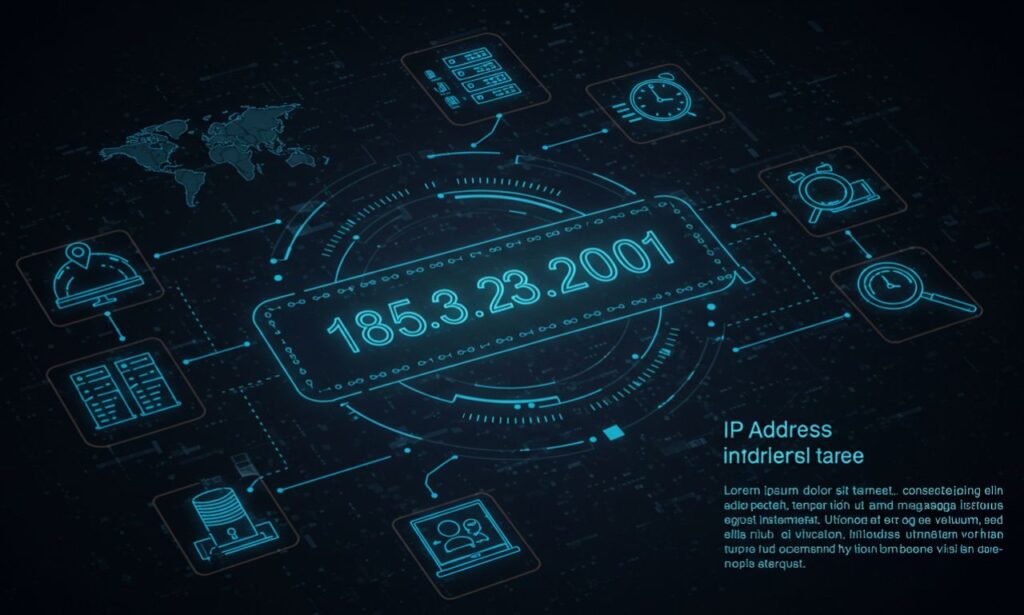When you see 185.63.253.2001, it looks like an IP address—but technically, it’s malformed. A proper IPv4 address consists of four parts (octets), each ranging from 0 to 255. The sequence “2001” in the last segment breaks that rule, making 185.63.253.2001 invalid.
Sometimes people type an extra digit, combine port numbers, or misplace dots—and that’s how addresses like this appear. In many cases, what was intended was 185.63.253.200 (or something similar).
Since 185.63.253.2001 cannot function in standard networking, it’s mostly a curiosity: an error, a typo, or perhaps a misinterpreted log entry.
Why 185.63.253.2001 Fails IPv4 Rules
To see clearly why 185.63.253.2001 fails, let’s review IPv4 structure:
-
An IPv4 address has 4 octets separated by dots (e.g.
A.B.C.D). -
Each octet must be an integer from 0 to 255.
-
If any octet exceeds 255, the address is invalid.
In 185.63.253.2001, the fourth octet is 2001, well beyond 255. That single violation is enough to invalidate the whole address.
It also can’t be IPv6, because IPv6 uses a different notation (hexadecimal and colons). So 185.63.253.2001 does not fit any standard IP format.
In short: it breaks the syntax.
How the Valid Address 185.63.253.200 Works
To correct the error, many sources suggest the intended address was 185.63.253.200. That is a valid IPv4 address—and there is real data associated with it.
Here’s what is known about 185.63.253.200:
-
It belongs to Hostpalace Datacenters Ltd (hosting services).
-
Its ASN is AS60064.
-
It’s located in Amsterdam, Netherlands (North Holland).
-
Its hostname is
static.185.63.253.200.host-palace.com. -
It lies in the IP block 185.63.253.0/24, which is owned by Hostpalace Datacenters.
This shows that the corrected address has legitimate infrastructure behind it.
Common Causes of Malformed IPs Like 185.63.253.2001
Why do these invalid strings appear? Here are typical reasons:
-
Typo / Human Error
Someone might have typed “2001” instead of “200” by mistake. -
Appending a Port or Extra Number
Sometimes logs or systems append a port number or extra digits without delimiter, causing confusion. -
Data Corruption or Parsing Bugs
In logs or database exports, bad parsing or corrupt data can distort valid IPs. -
Intentional Misdirection
In rare cases, fake addresses are used in malware, misdirection, or obfuscation.
When you see a string like 185.63.253.2001, treat it as a red flag to double-check the source.
Impacts & Risks of Invalid IP Strings
A malformed IP like 185.63.253.2001 might seem harmless, but it can have consequences:
-
Network Tools Fail
Ping, traceroute, or DNS lookups will error out. -
Log Analysis Issues
Security or monitoring systems might flag or discard entries with invalid IPs, causing gaps. -
Misleading Debugging
Developers might waste time chasing “ghost” IPs that don’t exist. -
Potential for Abuse
Attackers might use malformed addresses in spoofing or scanning to evade detection.
Thus, even though it’s not a functioning address, 185.63.253.2001 can cause confusion or noise in systems.
How to Detect & Handle Invalid IPs
If you come across 185.63.253.2001, follow these steps:
-
Validate Format
Use regex or IP validation tools to quickly check if each octet is between 0 and 255. -
Check Logs or Sources
Go back to the original system or log to see if there was a typo or corrupted export. -
Search for Plausible Alternate
Often the correct address is close—like 185.63.253.200. -
Exclude or Flag
In automated monitoring, exclude malformed entries so they don’t pollute alerts. -
Educate Users
If users enter IPs manually (in forms, settings), add input validation to block invalid formats.
By catching them early, systems stay cleaner and more reliable.
Why Understanding Valid vs Invalid IPs Matter
It’s useful to know the difference, especially in contexts like:
-
Network Administration
Ensuring only valid IPs are assigned avoids routing failures. -
Cybersecurity & Forensics
Distinguishing real vs malformed entries helps in logging, tracing, and incident response. -
Web & Hosting Management
Hosting providers allocate IPs—mistakes or invalid inputs can disrupt services. -
Software & API Design
Validation is critical to prevent injections, crashes, or malformed data.
Understanding that 185.63.253.2001 is invalid sharpens attention to detail in networking work.
Broader Lessons from 185.63.253.2001
This case can teach more than just one error:
-
Standards Matter
Protocols exist for a reason. Deviating from format disrupts interoperability. -
Human errors are inevitable
Therefore, systems must include checks and validation. -
Misinformation spreads easily
Copy-pasting invalid strings can propagate confusion. -
Correcting context is important
Rather than assuming an IP is real, one must verify origin, syntax, and intention.
So while 185.63.253.2001 is invalid, the discussion around it reinforces good practices.
Final Thoughts
-
185.63.253.2001 is not a valid IP—its last octet is out of range.
-
The more plausible correct address is 185.63.253.200, belonging to a Dutch hosting provider.
-
Malformed IPs often emerge from typos, parsing errors, or sloppy logging.
-
These errors can cause tool failures, noisy logs, or misdirected efforts.
-
Good systems validate IP inputs, flag anomalies, and trace back to correct data.



